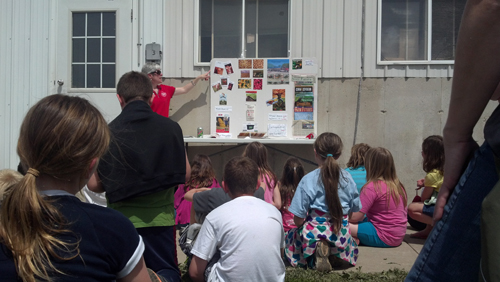by Lucas Sjostrom, Hoard's Dairyman Associate Editor


- Talk to your school principal for any projects you do in the school. You don't want to cross them, as they can be your best advocates to both teachers and the school board.
- Talk to the custodians. Many times our fun (dirty and messy) projects are causing them the most work. If we can keep custodians on our team, we've got a much better shot of doing more in the future.
- Acquire donations to help defray costs for teachers. She recommends asking in January, when other people aren't asking for money. Here are Nichelle's ideas on donations:
- Chain restaurants often are required to give so much money to local projects. Ask them, and you may get a quick yes, especially if you ask for help in the form of gift cards for volunteers.
- Farm, feed and fleet stores are often willing to give to projects. Do you want to help with a new garden? They may be willing to give you old (expired, but not dead) seeds.
- Hardware and home improvement stores could help with tools and may donate other products needed for a project.
- Seed companies give away free seeds online: here are two sites - www.dinnergarden.org/needSeeds.html and www.america-the-beautiful.org/free_seeds/index.php
- Grocery stores are good places to ask for donations for the local community, as are other area businesses.
- Gather your supplies, set a start and end date, and remember that most of these kids (even in small towns) don't know about agriculture.
- Volunteers are easy to find if you look in the right places. Of course, we can continually ask parents and families of agriculture, but here are a few other ideas:
- PTA/PTO members are often looking for projects. If you can go to the meetings you may find willing workers (who you can teach about agriculture).
- Local farmers are just as busy as the rest of us. But with some planning, we can spread out the workload.
- Local chefs may be willing to help with an agricultural project dealing with food growth or cooking.
- Civic groups and special forces could help with labor for a big project.
- Nutrition staff (cafeteria) can be overwhelmed by a "local foods" type project or farm tour. But Nichelle makes tours of her own farm a competition against other schools, and the nutrition staff are much more willing to help out.
- Wellness teams (physical education, family and consumer sciences, and nurses) often love to be involved in agricultural and food-related projects if they're asked.
- Nontraditional schools can be involved in creative ways. Nichelle has heard of one alternative school telling pupils with extra energy to go outside and pull weeds.
- Boy and Girl Scouts – for a recent garden project, Nichelle utilized the Boy Scouts to build the garden and the Girl Scouts to care for it. This way, the two groups both do things they're interested in.
- High school agriculture students, local farm organization members, state departments of agriculture and extension staff can also help with projects.
- Finally, the local health department, food stores, organic associations and food banks are four additional places to look for resources.
While this is a very long list already, one item of note is that areas with Kohl's department stores require that their employees volunteer for community projects each year. If you create a project they feel is worthy, they'll send you $500 and five volunteers. What could you do with that much extra help? Probably a lot!
Nichelle had other great ideas that we won't go into further detail on, but these should give you a good head start. She also recommended coordinating with your school so you can do a big project each year. At the school she "adopted," the kids already know which agricultural project they'll be doing each year, starting in first grade with a coloring contest and ending in fifth grade with an agricultural career week. and get the blog sent to you.








